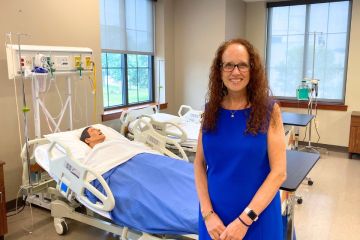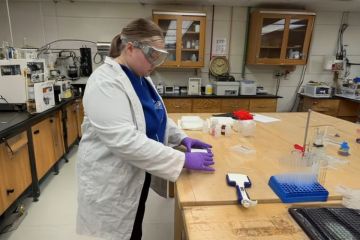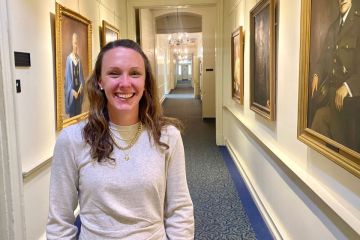Meet the Provost

Andrew A. Workman Ph.D. recently began his new role as Widener University provost.
What drew you to Widener?
It has a lot to do with what I think about the future of American higher education. Right now it’s in a period of transition, where we’re building a new model.
What’s interesting about American higher education is, it’s not great because it’s always held on to the past, but rather because it’s always changed. And Widener is a good example of that. It began as a Quaker boys’ school, that became a military college, that became Widener University with the addition of nursing and engineering and everything else. If you are rethinking higher education you want a place where the ability to evolve is in its DNA. That’s Widener.
Widener’s faculty and staff also have a history of being intently focused on student success. And that’s something I think we can build on. Widener’s faculty and administration also have a recent history of cooperating and working together productively that is, unfortunately, very rare in higher education.
Finally, to be successful in today’s environment a university needs to offer a comprehensive array of programs. Widener is not just a small liberal arts college, it’s not just professional programs, it’s not just undergraduate programs or graduate programs, it’s all of those things. And that’s really the basis for building a very powerful university.
Your work involves overseeing the full student experience, from student affairs to academic affairs. What do you think an exceptional student experience looks like?
It doesn’t have an academic affairs side and a student affairs side, and at Widener both are already linked and intertwined.
Traditional-age students are defining who they are and they do that through the multiple experiences on campus. Experiential learning is one of the most important parts of that. It’s what we do in the classes, but it’s also what happens outside the classes. So, the more we can support students in having experiences where they’re able to address problems in their communities, try out professional jobs, engage with social problems, learn to work with different groups of people, the better.
And that’s what Student Affairs does in so many ways, too. Whether it’s helping them learn to live in communities outside of family, sports teams that provide opportunities for teamwork, or the myriad social opportunities, we need to make sure those are all rich experiences.
Faculty are at the center of the student experience. How does Widener attract and keep the best faculty?
One way is being a place that helps them excel in their work. That means providing faculty development to help them be great teachers, and resources that support all of their work with students – we do that a little bit now but we’ll do it more so – and providing resources for them to create experiential learning opportunities. I also want to help them get more grants to develop the basic research that allows them to move on to more complicated work. As an institution, we need to honor faculty for the hard work that they do both in the classroom and in research.
What do you like to do when you’re not working?
I love to garden. I live in Philly and have a roof deck with a lot of planters. I also love to cook. I like complicated, difficult recipes and often after a hectic day, I’ll cook dinner because I find that fun and relaxing. I also love to walk in cities and learn their histories, so I’ve been having a lot of fun with that in Philadelphia.
Did you always like school, growing up?
No, I hated school in high school. I grew up in Mississippi and I loved learning and reading but I just hated school which kind of curiously got me interested in education. I questioned the high school model because it just wasn’t working for me and I ended up leaving a year early to go to college. My first year was at Millsaps College in Jackson. It was a much different learning environment and I thrived. I ended up earning my undergraduate degree from New College of Florida, which had a profoundly student-centered and self-directed model. A lot of how I think about education, and student support, and creating a rich, dynamic environment, comes from that experience of questioning models.
Did you ever have an 'a-ha' moment as an undergraduate or graduate student, where you knew higher education was the career for you?
I decided I wanted to go into publishing, and I did for a little while and did not like it. So, I took some time and looked at what my core values were and how I wanted to move forward with those in choosing a career. I knew I wanted to study history because that was something I loved, because it helps to make sense of the world, and I knew wanted to be an excellent educator. That meant graduate school, and then finding a job in a liberal arts college. I loved being a faculty member but when I started moving into administrative work – my institution was struggling and I got involved in helping it find its way out of that – I realized I could influence the experience for more students and bring what I was learning about helping students to succeed to new and larger institutions. That realization has shaped my work ever since.



